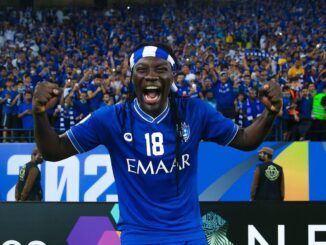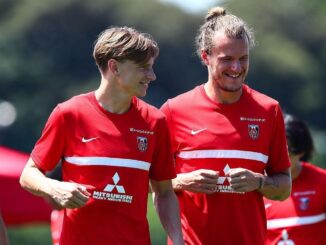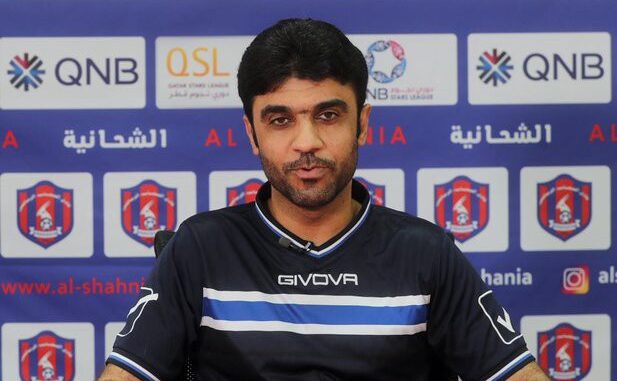
This story begins in the Chinese city of Wuhan nine months ago.
No, it’s not what you think; this is not about the coronavirus. Or is it?
On the 27th of October last year, Nabeel Anwar stood on the sidelines of the pitch at Wuhan’s Hankou Cultural Sports Centre stadium, listening to the Qatari national anthem play out on a pleasant autumn afternoon. For the 43-year-old assistant coach of Qatar’s national military football team, this was a unique opportunity.
Despite a two-decade long playing career that witnessed several triumphs at the club level, Nabeel had never managed to make an impression for the national team.
Jo Bonfrere had called him up once, but the midfielder was eclipsed by more prominent peers, and missed out on a number of Qatar’s major moments in the late 90s and the early 2000s, including the World Cup qualifier run in 1997 and the nation’s second Gulf Cup triumph at home in 2004.
As many top footballers have found out, the international dream is not always fulfilled.
The beginnings
At club level, Nabeel came through the Al Rayyan youth system before being included in the first team by Jørgen Larsen, the Danish coach who was at the helm of the Lions in three different stints. Nabeel has named Larsen as an influence, describing him as having “left a huge impression” on his career by giving him a chance as a youngster.
Nabeel won three trophies at Al-Rayyan before moving on to Al-Khor in 2001. Had he been able to stay at his childhood club for a few more years, he could have played with the likes of Fernando Hierro and Mario Basler (2003–04), or the de Boer twins and Sonny Anderson (2004–05) in the Galactico era of Qatari football. Yet, as we see from Nabeel’s career, missing out on big moments seemed liked a recurring theme.
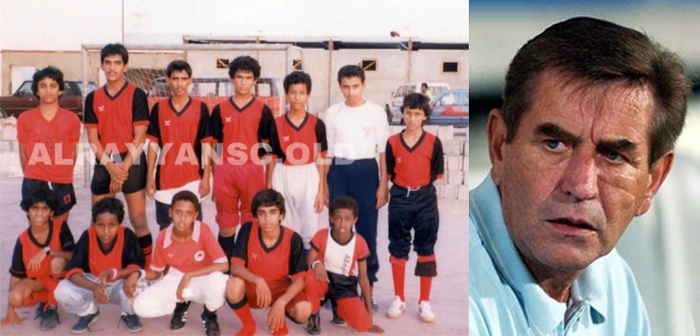
Writing history in the North
However, one may argue, Nabeel found something special in the northern city of Al Khor too. In 2002–03, the team won two pre-season trophies — the Qatar Joint Tournament and the Sheikh Jassim Cup, and then came tantalisingly short of the league title, finishing third, four points behind the champions Qatar SC after a late collapse.
It was in 2004–05, however, that Al Khor dazzled the country with their exciting team – and what a team that was.
Once again, they finished third in the league, but the Knights of Al Khor compensated by lifting the Heir Apparent Cup, the first major trophy in the club’s history. Nabeel was a silent warrior, one of the first names on the starting sheet in a team that featured the trio of Qatari legend Mubarak Mustafa, Moroccan wizard Rachid Rokki, and a fiery young Younis Mahmoud — all former or future league top scorers — in addition to a 22-year-old keeper known as Qasem Burhan.
That season, Nabeel also had the opportunity of playing against a certain Pep Guardiola, who he would later cite as his role model as a coach. For the record, Nabeel came out on top, with Al Khor defeating Guardiola’s Al Ahli 2–0.
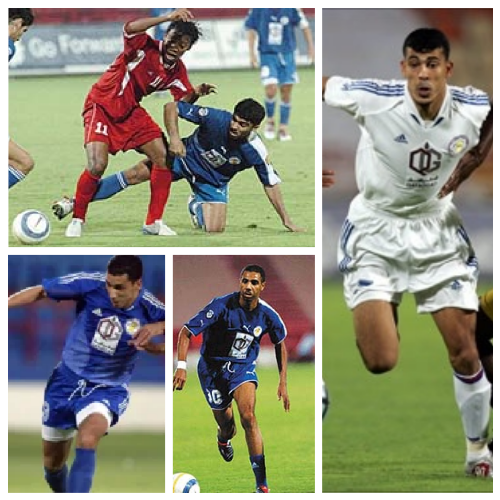
Missing out on/in Asia
The golden triangle of Al Khor left soon after, but Nabeel stayed and was part of another famous cup run in 2007, as team went all the way to the final of the Amir Cup.
This time, an AFC Champions League spot was at stake. Al Khor dragged league champions Al Sadd to extra time and then penalties, where the latter prevailed.
I was at the stadium that night when it happened, as a 13-year-old Al Sadd fan celebrating a historic quadruple for my side. I didn’t notice Nabeel, but thinking back to that game, I can imagine the soul-crushing nature of the defeat for him and his Al Khor mates, who missed out on the lucrative trophy and continental qualification.
Nabeel would get another go at finally playing in Asia, when he signed for Umm Salal in 2009. That year, Umm Salal had surprised an entire continent with their debut appearance in the tournament, as they first qualified for the Round of 16 stage and then knocked out Saudi giants Al Hilal (a defeat that’s talked about to this day).
Going into the quarter final against FC Seoul, Umm Salal decided to strengthen their domestic contingent, and in came Nabeel, by then an experienced local veteran.
Umm Salal continued their dream run by going further and reaching the semifinals, but as luck would have it, Nabeel would only see around nine minutes of action.
Embed from Getty ImagesI still remember watching the thrilling 3–2 comeback victory over FC Seoul in the first leg at the Suhaim bin Hamad Stadium. That Seoul side was coached by Senol Gunes, and had the likes of Ki Sung-yueng and Dejan Damjanovic.
I’m sure Nabeel would have loved to have a proper go at them but he only came on as a late substitute. He wasn’t used by coach Gerard Gili for the next game and then got eight minutes of time in the semi final second leg against Pohang Steelers, as Umm Salal crashed out.
Near misses had become the recurring theme in Nabeel’s career, so much so that even when the big moments came, there was often something to overshadow them.
Learning to be a coach
After a single season at Umm Salal, Nabeel moved again, this time to Al Kharaitiyat, where he would rise to become captain and help establish the team as a mid-table QSL side, after several seasons spent shuttling between the two divisions.
Finally, Nabeel’s career came to a close at Al Shahania.
Local players are not known to have very long careers in Qatar, but Nabeel pulled the strings in midfield for over two decades — and having played to the age of 40 at Al Shahania, he saw himself becoming a sort of coach figure as well for his younger teammates.
However, just having the experience doesn’t count for much. Nabeel knew that and went on to begin his coaching training, earning the D, C and B licenses while still a player at Al Shahania. After his retirement in 2017, he got his A license as well. By then, his status at Al Shahania had grown so much that they made him assistant to head coach Jose Murcia.
He had joined a number of his peers who had taken to coaching after the end of their playing careers. Yet, opportunities for Qatari coaches remained few and far in between.
In an interview given to Al Arab daily, Nabeel said: “As Qatari coaches, we hope to get the opportunity that the foreign coach gets. When a foreign coach fails in one club, he gets a contract with another club, unlike the native coach who is considered an emergency replacement only. This is the reason Qatari coaches do not become prominent. Why not give the opportunity to the local coaches like other Gulf leagues?”
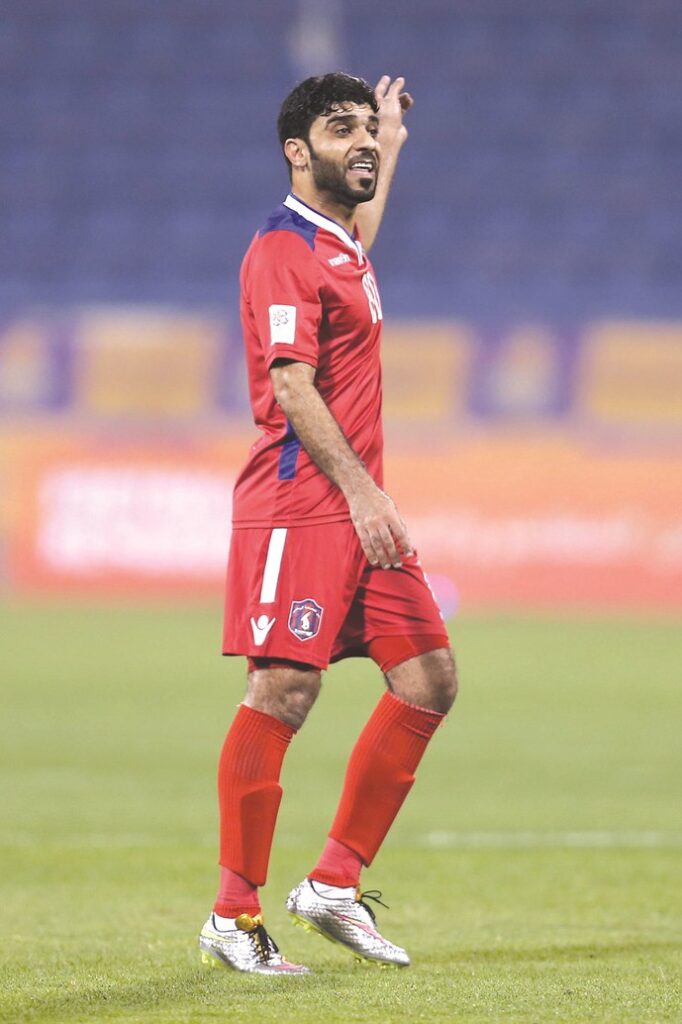
Al Sharq published a report last month looking at the situation. Out of 497 coaching jobs in the country in all categories, 75 were filled by locals. The number has kept rising in recent years, as more and more hopeful coaches earn licenses and start seeking opportunities.
In Nabeel’s case, he had grabbed his with both hands and was already aiming high.
An adventure in Wuhan
Looking back at his playing career, it would be natural for Nabeel to feel pretty satisfied having achieved what he did.
Yet, there was something missing. Nabeel mentioned in an interview upon announcing his retirement that his greatest unfulfilled desire was playing for Qatar at an international tournament like the Asian Cup or the Gulf Cup.
“I couldn’t achieve one thing, playing for Qatar in the Gulf and Asian Cups. This was down to the view of the coaches and I respect that very much. Otherwise, I’ve achieved everything as a player.”
Nabeel Anwar
Nothing may beat that for him, but in some way, being on the coaching staff of a Qatari national team, even if the military side, may have represented a new route to pursue that dream.
This could be the start of something great, a step towards breaking the stranglehold of foreign coaches at the helm of the national team setup.
Those were some of the thoughts running through my mind when I heard of Nabeel becoming the assistant coach of the military team. One can imagine Nabeel himself pondering the same while standing on the sidelines that afternoon in Wuhan.
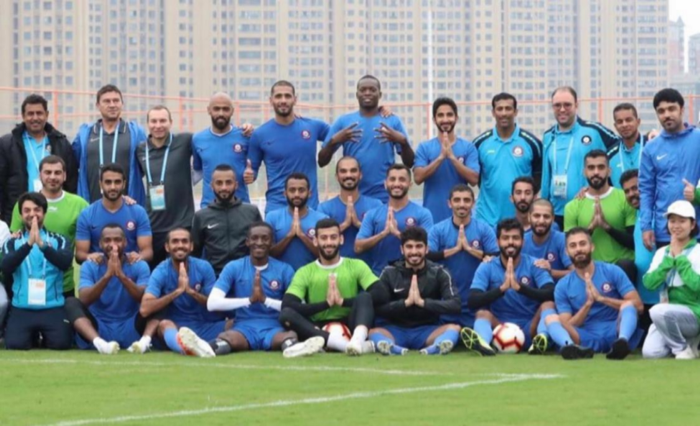
As for that match, in the final of the Military World Games football tournament, Qatar would suffer a bitter 3–1 defeat to neighbours Bahrain. Both teams featured ‘professional players’; the lines between ‘civilian’ and ‘military’ can sometimes be blurred in this region, like in some other parts of the world.
In Qatar’s case, many, if not all, of the squad members had played either with or against Nabeel in the QSL. Perhaps, that was the reason he got picked as assistant to head coach Abdulqadir Al Meghessib, someone who had overseen his coaching license training at the Qatar Football Association.
Whether it was down to Nabeel’s knowledge of the players or not, we may not know; regardless, Qatar did pretty well at the tournament. The Maroons had finished fourth on two occasions but this was their first appearance in the final.
On the way to the gold medal match, they defeated the United States and drew with Ireland and defending champions Algeria to progress from the group stage. Qatar then got past Egypt and North Korea in the quarter finals and semi finals to set up the decider with Bahrain.
Eventually, they ran out of gas, and were overcome by a brilliant Bahrain side led by the freshly naturalised Thiago Augusto, who would later star for the country just months later in their Gulf Cup win in Doha.
Ups and downs at Al Shahania
For Nabeel, the Wuhan experience must have been particularly useful, despite the loss. Being part of that campaign added another dimension to his budding coaching career, which began in 2017. In his very first season as assistant to Jose Murcia at Al Shahania, the team won promotion back to the QSL.
2018–19 followed, and it would be a historic season for the team from the city known more for its camel racing heritage. Led by the veteran former Real Madrid defender Alvaro Mejia (who is currently in his sixth season at the club), Al Shahania not only survived in the QSL for the first time ever, they also finished in a respectable seventh place.
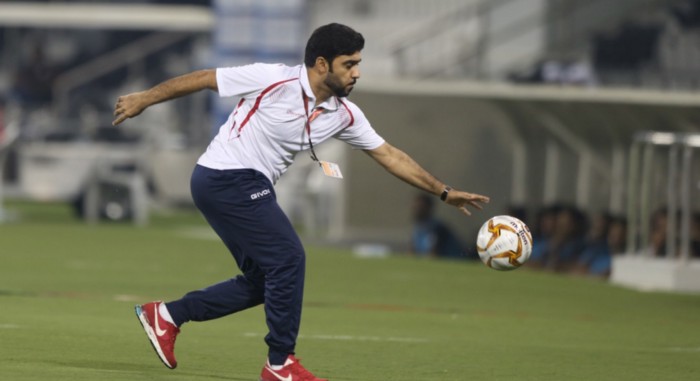
After that historic season, 2019–20 has been, to put it mildly, a disaster. When Nabeel left for Wuhan in October, the team was rock bottom of the league, having lost 5 of their first 6 games.
The pressure piled on the team, who could not register a win for the rest of the year.
Then came 2020.
2020
Two months after Nabeel and the Qatar military team left Wuhan, a mysterious virus spread in the city. It would soon reach other parts of China and then, the rest of the world.
What ensued turned our lives upside down, and sport was obviously affected as well. In Qatar, all sporting activity ceased in the middle of March as the daily toll began to rise.
Meanwhile, conspiracy theories surrounding the Military World Games in Wuhan and the COVID-19 pandemic came to the fore. Nabeel had nothing to do with those stories, but the virus did have something to do with him getting a promotion.
The temporary suspension of the season meant that contracts were running out, with the matches yet to be completed. Some players signed short-term contracts to stay on until the season’s scheduled finish in August. Others refused.
In June, Al Shahania head coach Jose Murcia’s contract came to an end and he left, without having reached an agreement with the management. That left the club looking for options. Enter Nabeel Anwar. His big opportunity had finally arrived, in surprising fashion.
Many others who share a similar career graph have fizzled out and remain obscure. But that’s not Nabeel. He looks determined to make that big splash at the big stage and prove his ability.
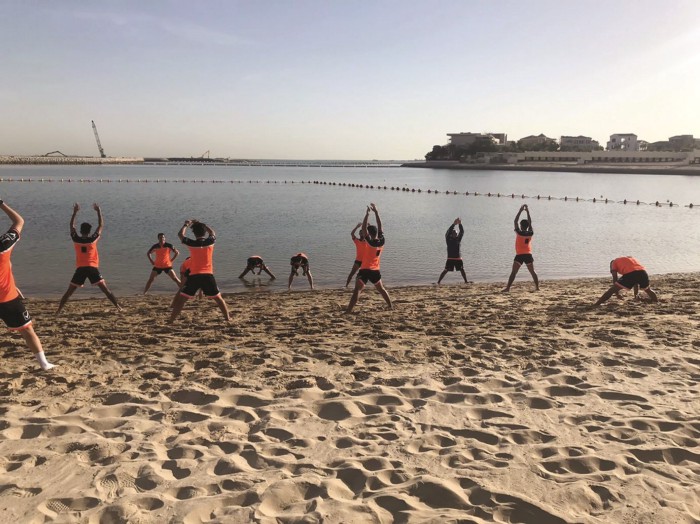
Will he able to do that? There’s nothing quite like the baptism of fire that is the Al Shahania coaching job at this point in time, with the team sitting bottom of the table going into the QSL’s restart, four points adrift of safety with five rounds to go. It is not impossible, but keeping the team in the league will be a mighty task.
Before he had even settled down to the new job, Nabeel had to deal with an alarming situation: both of his team’s starting strikers left the team. Ahmed Akaichi refused to extend his short-term contract and moved to Al Ahli. Ali Ferydoon, on loan from Al Shamal, also followed suit, reportedly angry at an Al Shahania team official’s statement referring to his parent team.
Omani international Jamil Al Yahmadi has come in from Al Wakrah as a stop-gap solution, but it remains to be seen if he can make an impact, having just recovered from a ligament injury that had him sidelined since August last year.
Nabeel remained confident nonetheless, sounding upbeat in a statement to local daily Al Sharq. “The departure of Akaichi and Ferydoon is not the end for us,” he said. “It does not mean that we surrender; we must continue in our efforts as the coaching staff and bring the team up to the best possible level during the preparatory phase. We must fight until the last minute of the league in order to reach our goal — the survival of the team in the first division.
In short, it’s been a tumultuous year for Nabeel Anwar. Nobody wants to take up a job like this in these circumstances, but regardless of the result, it’s going to be a challenge Nabeel will relish.
In February, Jorgen Larsen passed away. Nabeel’s former coach and mentor at Al Rayyan will not see his ward make his debut in management, but we know he would be proud if he did.
The story was originally published by QFoot Live and has been republished with their approval and permission.



